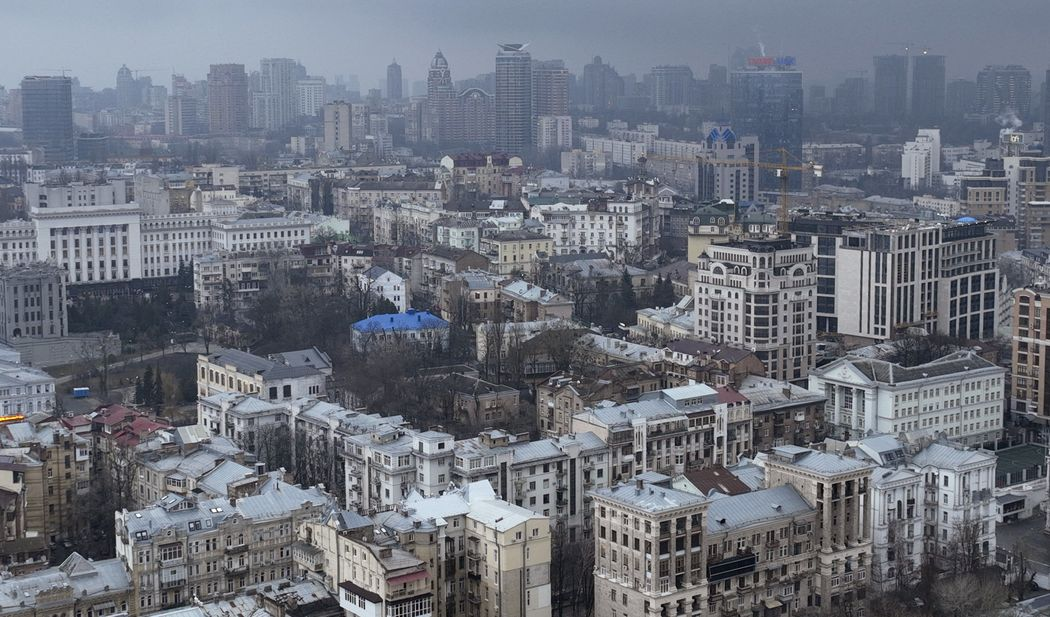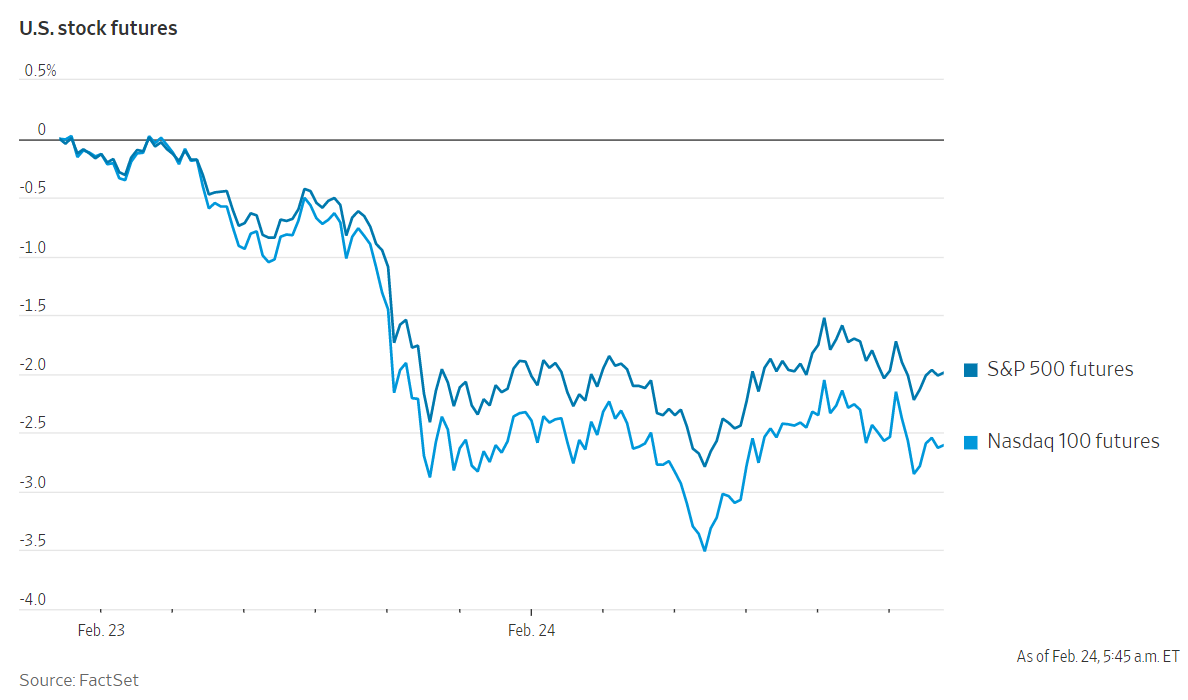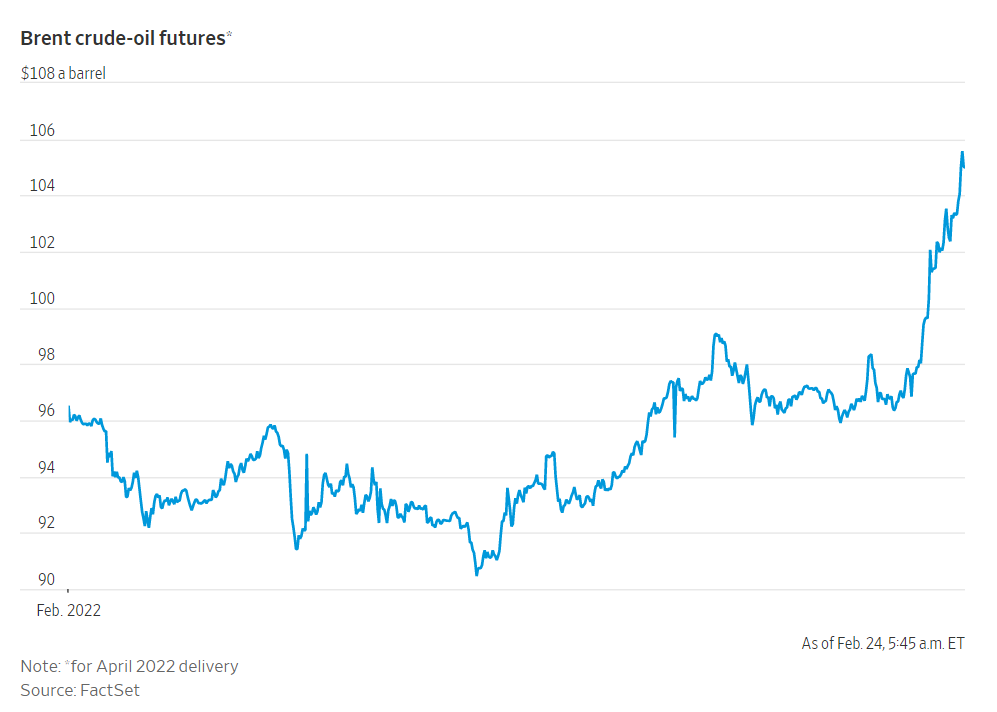Attack sends stocks lower and oil rises above $105 a barrel
Investors rushed for safety, pushing down stocks and lifting the prices of oil, gold and government bonds, after Russian missiles and airstrikes hit Ukraine’s capital, Kyiv, and more than a dozen other cities across the country.
Futures tied to the S&P 500, Nasdaq-100 and Dow Jones Industrial Average fell between 1.4% and 2.2%. The S&P 500 reached correction territoryearlier in the week, and futures are indicating the Dow is on track to do the same.
The Russian attack—swiftly condemned by President Biden—heightens the pressure on a global economy already reeling from snarled supply chains and some of the highest inflation in years, with Europe likely to bear the brunt of the economic impact.
“This is what appeared unbelievable to most investors, and this is actually happening,“ said Slava Smolyaninov, Moscow-based chief strategist at BCS Global Markets. “It’s a complete change of everything; we are in a different world right now.”
The pan-continental Stoxx Europe 600 fell over 3%. The MOEX benchmark for Russian stocks tumbled 24%, putting it on course for its biggest drop on record. Asian stock indexes also fell sharply, with Hong Kong’s Hang Seng Index dropping over 3%, and Japan’s Nikkei Stock Average closing at its lowest since November 2020.
The Russian ruble weakened to a record low, declining as much as 9% against the dollar and trading at 90 rubles to $1, before recovering moderately. The Russian central bank said it would intervene in the foreign-exchange market and banned short selling.
Ukraine’s foreign-exchange market suspended its operations under martial law measures, according to a statement from its central bank. The country’s stock exchange also said it was postponing activity.
Brent crude oil, the global benchmark,topped $100 a barrel for the first time since 2014, with the front-month contract rising 8.5% to $105.15. Prices for its U.S. equivalent, West Texas Intermediate, also jumped.
Other commodities markets also convulsed. Natural-gas futures in Europe surged 31% and benchmark prices for aluminum and nickel, two metals for which Russia is a major producer, rose to their highest levels in about a decade. Wheat and corn futures also advanced to multiyear highs, since both Russia and Ukraine are major grain producers.
“We thought Putin’s strategy was largely around negotiation; this was the consensus among investors. We haven’t had any serious military conflict in Europe for a very long time so there’s no playbook for this,” said Gregory Perdon, chief investment officer at Arbuthnot Latham.“A lot has changed since last night.”
Gold and U.S. Treasury bonds, which both typically rally in times of stress, rose in price. The most actively traded gold futures contract added 2.4%, to about $1,957 a troy ounce, the highest level since September 2020.
The yield on the benchmark 10-year U.S. Treasury note declined to 1.875% from 1.976% on Wednesday. Bond yields fall as prices rise. European government bonds also rallied, with the equivalent German bund yield falling as low as 0.111%.
The dollar strengthened, with the WSJ Dollar Index gaining 0.6%. Currencies considered to be havens, such as the Japanese yen, also appreciated, while cryptocurrencies tumbled, with bitcoin falling nearly 6% to about $35,300.
Investors are building up their cash buffers due to the market stress, said Florian Ielpo, head of macro at Lombard Odier Investment Managers. The funds he manages currently hold the most cash since the market crash in March 2020.

Shares of European companies with sizable operations in Russia tumbled. Austria’s Raiffeisen Bank,which had over 20% of its workforce in Russia at the end of 2021, declined 17%. French car maker Renault,which also has a large Russian subsidiary, fell 7%.UniCredit declined 9%, triggering a halt in trading.
The Russian attack comes at a time where volatility in markets was heightened, due to looming changes in Federal Reserve monetary policy.
“The game-changer for me is, what does this mean for the Fed? Ultimately now, interest rate hikes and aggressive tightening are going to be very difficult,” Mr. Perdon said.
Amid the chaos, Chinese e-commerce giant Alibaba and vaccine-maker Moderna are expected to post earnings ahead of the opening bell.Beyond Meat,Etsy and cryptocurrency exchange Coinbaseare scheduled to report after markets close.
The latest data on U.S. weekly jobless claims are expected at 8:30 a.m. ET. Economists expect the number to edge down amid the tight labor market, after it rose unexpectedly last week.


